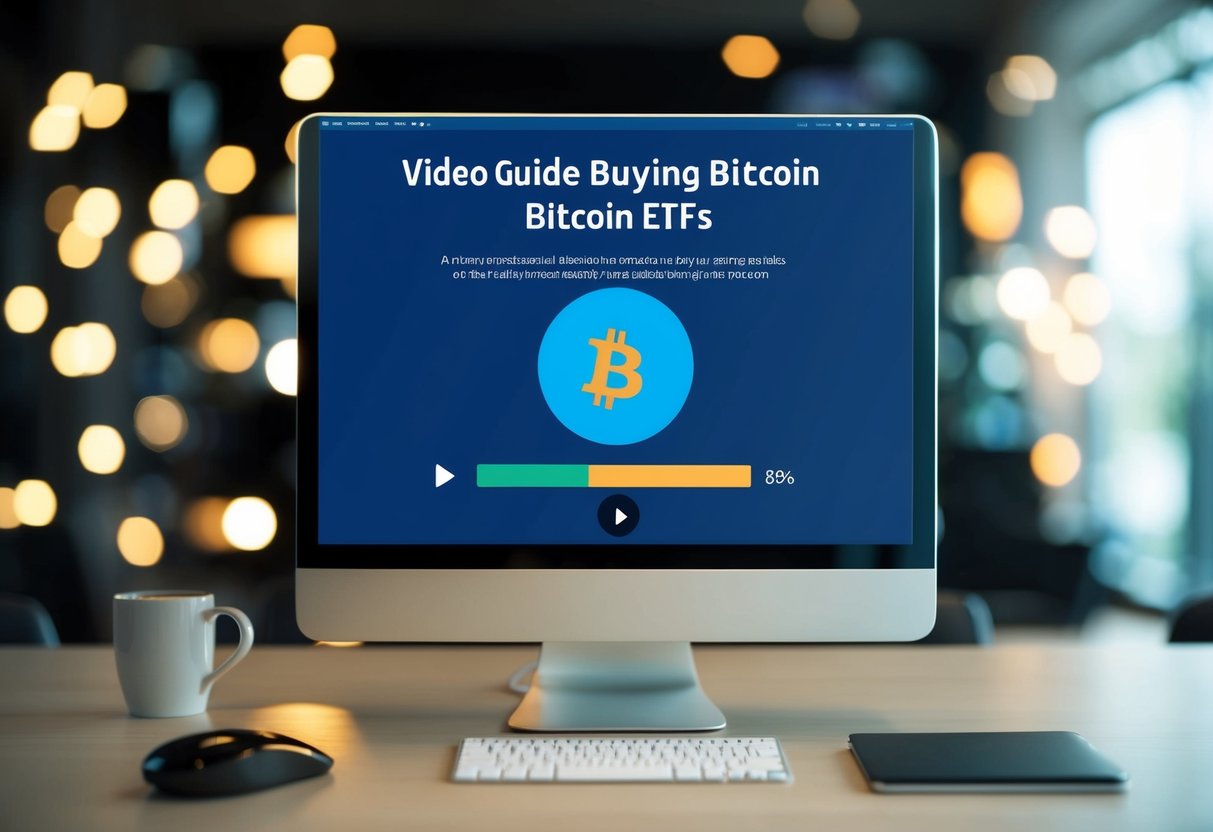A Bitcoin exchange-traded fund (ETF) is an investment fund that lets you put money into Bitcoin without actually holding the cryptocurrency. Some important things to keep in mind are:
- What They Are: A Bitcoin ETF tracks the price of Bitcoin and offers shares to investors on a stock exchange. This means you can buy and sell shares of the ETF just like any other stock.
- Forms of Investment: Investing in a Bitcoin ETF can be a simpler option for those who want exposure to Bitcoin, as it avoids the complexities of buying and storing the actual digital currency.
- Benefits:
- Regulation: Bitcoin ETFs are regulated by financial authorities, which can provide an extra layer of security for your investment.
- Accessibility: You can easily trade them through a brokerage account during market hours.
- Types: There are various types of Bitcoin ETFs available, including those that hold physical Bitcoin or those that invest in Bitcoin futures. Knowing the difference can help you choose the right one for your investment strategy.
- Risks: Like all investments, Bitcoin ETFs come with risks. The price of Bitcoin can be volatile, which means that the value of your ETF shares can also change rapidly.
- Store of Value: Many investors see Bitcoin as a store of value, similar to gold. A Bitcoin ETF can help you gain exposure to this asset class in a more traditional investment format.

Bitcoin ETFs let you buy in Bitcoin without actually holding the Bitcoin itself. You can buy and sell these funds on regular markets. They are shares that are backed by real Bitcoin. Investors and businesses can get into Bitcoin in a controlled way with this set-up.
Even though Bitcoin ETFs can help more people trade in and accept Bitcoin, it’s still a good idea to remember that holding Bitcoin itself may be safer. If you own Bitcoin, you can keep it in your own wallet, which gives you full control. With ETFs, on the other hand, you don’t actually own the coins; instead, your broker manages them for you.
Key Points to Remember
- Exposure: Bitcoin ETFs give you a way to invest in Bitcoin through regular financial markets.
- Ownership: You don’t hold the Bitcoin itself, which could affect your investment strategy.
- Control: Owning real Bitcoin allows you to manage your assets independently.
Prefer Visuals? Check Out Our Video

For those who find it easier to absorb information through visuals, our video guide is the perfect resource for you. You’ll discover all the key insights in a way that’s engaging and straightforward. Just click the link below to start watching.
- Watch at your own pace
- Pause and rewind as needed
- Access on any device
Dive into the visual experience and enhance your understanding of the topic today.
Before Bitcoin ETFs
Before January 10, 2025, the only available methods for you to obtain Bitcoin involved using crypto exchanges or brokers, along with self-management of your digital coins. This meant you had to select a crypto exchange, purchase Bitcoin directly, and then securely store it in a wallet of your choice.
With self-custody, you took on the responsibility of keeping your assets safe. This required a good level of knowledge and experience. You had to identify a reliable exchange with reasonable fees and understand how to securely store Bitcoin, often in cold storage, which involves offline methods like hardware wallets.
Before the rise of spot Bitcoin ETFs, traditional financial brokers could not facilitate Bitcoin investments, making it harder for you to integrate cryptocurrency into your retirement plans or diversified portfolios.
Now, you can easily acquire shares of Bitcoin ETFs through established brokerages like Fidelity and Charles Schwab, or user-friendly platforms like Robinhood and eToro. This new development allows for a safer and more accessible way to invest in Bitcoin without the complexities of direct ownership.
Understanding ETFs
An ETF, which stands for exchange-traded fund, is a type of investment that is traded on stock exchanges, just like regular stocks. It aims to track the performance of various underlying assets, such as stocks, bonds, or commodities. You can buy these funds through common financial services companies like Charles Schwab, Fidelity, or Vanguard.
Here’s a breakdown of the ETF components:
- E for Exchange: This means you can buy and sell ETFs on an exchange through a broker, similar to how you would trade individual stocks.
- T for Traded: ETFs are actively traded, leading to changes in their prices throughout the trading day.
- F for Fund: Typically, ETFs contain a diversified mix of assets that mirror the performance of a specific index or sector. By investing in an ETF, you gain exposure to an entire asset class without purchasing each asset individually.
ETFs offer a convenience similar to mutual funds, yet they trade on exchanges like stocks. This means you have the potential for quick trades and price adjustments during market hours.
Investing in an ETF allows you to engage with particular markets without directly buying the underlying assets, which can be beneficial when dealing with complex investments. For example, if you’re interested in gold, purchasing a gold ETF is simpler and more practical than acquiring and managing physical gold bars.
Other commonly available ETFs include those focused on silver, real estate, crude oil, and natural gas.
In the United States, ETFs are regulated by the U.S. Securities and Exchange Commission (SEC). This regulation helps maintain investor protection and curbs fraudulent practices.
What is a Bitcoin ETF?
Bitcoin ETFs are investment funds that allow you to invest in Bitcoin without actually owning it. Like traditional ETFs, they are regulated investment vehicles that provide a way for you to get exposure to the Bitcoin market without the need for direct ownership, storage, or security concerns associated with cryptocurrencies.
Bitcoin ETFs are listed on established securities exchanges. In the U.S., you can find them on platforms like the New York Stock Exchange and Nasdaq. If you’re in Canada, they appear on the Toronto Stock Exchange (TSX), while Europe features them on the Euronext Stock Exchange (ENX).
When you invest in a Bitcoin ETF, you are buying shares in a fund that holds Bitcoin. You aren’t directly acquiring Bitcoin; you are essentially purchasing proof of your share in the underlying assets.
How do Bitcoin ETFs work?
An ETF issuer, typically a financial management company such as BlackRock or Franklin Templeton, buys Bitcoin and securely stores it with a custodian. This custodian is responsible for keeping the Bitcoin safe. When you invest in the ETF, you essentially get a share in this pool of Bitcoin.
For a fee, which serves as an annual management cost, the issuer handles all the complexities, from purchasing to securely storing Bitcoin for you. Some large financial firms, like BlackRock and Grayscale, choose Coinbase for the secure storage of their Bitcoin assets.
Spot Bitcoin ETF vs. Bitcoin Futures ETF
A Spot Bitcoin ETF directly tracks the current market price of Bitcoin. It gives you real-time exposure to Bitcoin’s value. In contrast, a Bitcoin Futures ETF focuses on contracts that speculate on the future price of Bitcoin rather than its current price. This means that while a Spot Bitcoin ETF reflects today’s market movements, a Futures ETF reflects market predictions for Bitcoin’s price at a specified future date.
How to buy a Bitcoin ETF
To purchase a Spot Bitcoin ETF, you can use online brokers such as Robinhood, eToro, Fidelity, WeBull, and Charles Schwab. Additionally, you have the option to include a Bitcoin ETF as part of a traditional IRA, Roth IRA, or 401(k) retirement plan.
Advantages and Disadvantages of Bitcoin ETFs
What are the advantages of Bitcoin ETFs?
Investing in a Bitcoin ETF offers several benefits that can make it an appealing option for many investors. Here are some key points:
- Easy Access: You can purchase a Bitcoin ETF through traditional brokerage accounts that you might already have, such as Fidelity or Charles Schwab. This eliminates the need to find a cryptocurrency exchange, making it straightforward to buy and sell.
- No Need for Technical Skills: With Bitcoin ETFs, you don’t need to understand how to manage cryptocurrencies, create wallets, or secure your private keys. This is particularly helpful if you’re not tech-savvy.
- Retirement Fund Options: Bitcoin ETFs can be included in investment vehicles like retirement accounts, providing a way to gain exposure to Bitcoin within your long-term savings strategy.
- Less Responsibility for Security: When you invest in a Bitcoin ETF, you don’t have to worry about the safety of storing the actual Bitcoins. The fund takes care of this, reducing the risk of losing your investment due to hacks or breaches.
What are the disadvantages of Bitcoin ETFs?
While there are clear benefits, there are also notable downsides to consider when it comes to Bitcoin ETFs. Here are some factors to keep in mind:
- Potentially Higher Costs: Buying a Bitcoin ETF could be more expensive compared to purchasing Bitcoin directly. Brokerage fees and annual charges may apply, impacting your overall investment return.
- Limited Trading Hours: Traditional stock markets have set trading hours, unlike the 24/7 cryptocurrency markets. This means you might miss out on significant price changes that occur when the market is closed.
- Volatility Risks: During periods of high volatility, some ETFs might halt buying or selling to protect investors. This can prevent you from reacting to rapid market changes.
- Third-Party Risks: When you own a Bitcoin ETF, the actual Bitcoin is held by a third party. This introduces risks associated with potential hacks or custody issues, which you wouldn’t face if you managed your own Bitcoin.
- Lack of Anonymity: Investing in a Bitcoin ETF is not private. Your broker will have complete visibility into your transactions, which goes against Bitcoin’s original ideals of privacy and decentralization.
- Limited Use Case: Bitcoin ETFs are essentially vouchers redeemable through your brokerage. Unlike actual Bitcoin, you can’t use them for purchases, send them to others, or have full control over your assets.
Risks of Investing in Bitcoin ETFs
While Bitcoin ETFs make crypto investing more accessible, they still come with notable risks. The biggest is market volatility—Bitcoin’s price can swing dramatically in short periods, and ETF holders are exposed to the same ups and downs.
Another concern is management fees and tracking errors. ETFs don’t always perfectly follow Bitcoin’s spot price, which can impact returns over time. Investors also give up direct ownership of Bitcoin, meaning they can’t use it for transactions, staking, or transferring to a private wallet.
Finally, regulatory and macroeconomic factors can affect ETFs more than direct holdings. Policy shifts, interest rate changes, or institutional sell-offs may create sudden price shocks.
Why Investors Choose Bitcoin ETFs Over Direct Crypto Purchases
Many investors prefer Bitcoin ETFs because they offer a simpler, safer entry into the crypto market. Unlike direct purchases, ETFs don’t require setting up digital wallets, managing private keys, or navigating crypto exchanges—barriers that often discourage traditional investors.
ETFs also provide regulatory oversight and transparency, which builds confidence for institutions and retail investors alike. They can be bought and sold easily through standard brokerage accounts, just like stocks, making Bitcoin exposure more convenient.
Another advantage is reduced security risk. With ETFs, investors aren’t responsible for safeguarding their Bitcoin against hacking or accidental loss. Instead, professional custodians handle storage and compliance.
Which Bitcoin ETF is the best to buy?
Overview of some popular Bitcoin ETFs and what factors you might consider when deciding which one could be best for your needs.
1. Types of Bitcoin ETFs
- Spot Bitcoin ETFs – Hold actual Bitcoin. These generally track the price of Bitcoin more directly. Examples in the U.S. (approved in 2024) include:
- iShares Bitcoin Trust (IBIT) – Managed by BlackRock.
- Fidelity Wise Origin Bitcoin Fund (FBTC) – Managed by Fidelity.
- ARK 21Shares Bitcoin ETF (ARKB) – ARK Invest + 21Shares.
- VanEck Bitcoin Trust (HODL) – Managed by VanEck.
- Bitcoin Futures ETFs – Hold Bitcoin futures contracts instead of the asset itself. These can have higher costs and may not perfectly track spot prices. Examples:
- ProShares Bitcoin Strategy ETF (BITO)
- Valkyrie Bitcoin Strategy ETF (BTF)
2. Key Factors to Compare
- Expense ratio – Lower fees mean less drag on returns over time.
- Liquidity & trading volume – Higher daily volume can mean tighter bid-ask spreads.
- Tracking accuracy – How closely the ETF follows Bitcoin’s spot price.
- Custody & security – How the ETF stores its Bitcoin (for spot ETFs).
- Issuer reputation – Established asset managers may offer more trust and stability.
3. General Observations (as of mid‑2025)
- Spot Bitcoin ETFs like IBIT and FBTC have attracted the most assets and liquidity since launch.
- IBIT (BlackRock) and FBTC (Fidelity) have some of the lowest expense ratios (~0.20–0.25%).
- ARKB and HODL also have competitive fees and strong backing but slightly less liquidity than IBIT/FBTC.
- Futures ETFs like BITO may be less efficient for long-term holding due to roll costs.
If you’re looking for long-term exposure and minimal tracking error, many investors lean toward the largest and most liquid spot Bitcoin ETFs with low fees, currently IBIT and FBTC are leading in that space.
Selecting a Bitcoin ETF
When deciding which Bitcoin ETF to invest in, consider several important factors that can affect your investment experience and returns.
- Management Fees: Also known as the expense ratio, lower fees generally lead to better returns since they make your investment more aligned with actual Bitcoin. Occasionally, ETF providers may temporarily waive management fees to attract investors.
- Issuer Reputation: Opt for ETFs from established issuers with a solid history of managing funds. A reputable issuer is more likely to track Bitcoin’s price accurately and handle your investment responsibly. Experience with crypto assets is a strong advantage.
- Assets Under Management (AUM): A higher AUM often indicates greater investor trust and confidence in the ETF. It typically also signifies better liquidity, making it simpler for you to buy and sell shares when needed.
Notable Bitcoin ETFs
iShares Bitcoin Trust
The iShares Bitcoin Trust is BlackRock’s entry into the Bitcoin ETF market, traded on Nasdaq with the ticker symbol IBIT.
It boasts an expense ratio of 0.25%, making it one of the more affordable options in its category. This fund is designed to attract a wide range of investors, particularly focusing on younger clients like millennials as well as affluent individuals. The underlying Bitcoin assets are securely held by Coinbase, providing a trusted custody solution.
Grayscale Bitcoin ETF
Grayscale’s Bitcoin Trust is listed on the New York Stock Exchange as GBTC. Initially created in 2013, it was the first publicly traded Bitcoin investment fund and grew to become the largest in terms of assets under management.
Grayscale faced challenges with the US Securities and Exchange Commission (SEC) while trying to convert this trust into a formal ETF structure. With an expense ratio of 1.5%, it has some of the highest fees in the market. This fund also uses Coinbase for asset custody, alongside BNY Mellon for its accounting and administration processes.
Bitwise Bitcoin ETF
Trading under the ticker BITB on the New York Stock Exchange, the Bitwise Bitcoin ETF presents a low-cost opportunity for investors with an expense ratio of just 0.20%.
This fund stands out not only for its competitive pricing but also because it allocates 10% of its proceeds to support Bitcoin developers, reinforcing ties with the broader cryptocurrency community. Backed by Bitwise’s extensive experience in managing crypto assets, this fund is administered by BNY Mellon, and like others, its Bitcoin custody is facilitated by Coinbase.
Fidelity Wise Origin Bitcoin Fund
The Fidelity Wise Origin Bitcoin Fund trades as FBTC on the New York Stock Exchange and features an expense ratio of 0.25%.
Designed to provide a standard investment framework and transparent pricing, this fund is easily integrated into client portfolios. Since 2014, Fidelity has been actively researching Bitcoin and blockchain technologies, contributing a depth of knowledge to the fund’s management. Unlike other ETF providers, Fidelity opts for self-custody of its Bitcoin through Fidelity Digital Asset Services, LLC, thereby maintaining direct control over security and storage without relying on third-party custodians like Coinbase.
The Influence of Bitcoin ETFs on Bitcoin’s Price
Bitcoin ETFs require the companies behind them to hold real bitcoins, which creates buying pressure. This increased demand often leads to a rise in Bitcoin’s price as more ETFs enter the market.
With the introduction of Spot Bitcoin ETFs, institutional investors like pension funds and hedge funds can now invest in Bitcoin. This can further drive buying pressure and push prices higher.You should be aware that Bitcoin is known for its volatility.
Factors such as trading volume and market manipulation can influence price movement. The daily volume of trades affects liquidity, impacting how easily Bitcoin can be bought or sold. Always do your own research, as market conditions can change rapidly.
9. Final Thoughts
Bitcoin ETFs present a fresh opportunity for you to engage with Bitcoin in the investment landscape. These funds make it easier for both individual and institutional investors to gain exposure to Bitcoin without needing extensive technical knowledge. Here are some key points to consider:
While Bitcoin ETFs offer a more straightforward way to invest, you may prefer holding actual Bitcoin from a reputable exchange or broker, such as Kraken or Coinmama. This approach reduces reliance on third parties and allows you more freedom to use or transfer your Bitcoin.
Have you tried any Bitcoin ETF products? Share your thoughts in the comments below.
Institutional Adoption and Market Impact of Bitcoin ETFs
The approval of Bitcoin ETFs has accelerated institutional adoption of cryptocurrency, transforming how traditional finance interacts with digital assets. Major firms like BlackRock, Fidelity, and VanEck have launched spot Bitcoin ETFs, attracting billions in inflows within months. This marks a significant shift, as institutions that were once hesitant now view Bitcoin as a legitimate, regulated investment vehicle.
The market impact has been profound. Bitcoin ETFs increase liquidity, accessibility, and legitimacy, drawing in not just hedge funds but also pension funds, family offices, and retail investors through standard brokerage accounts. This has reduced barriers to entry while boosting overall demand for Bitcoin.
Bitcoin ETF 2025 Statistics Snapshot
Based on August 2025 market and industry data:
Bitcoin ETF Market Overview – 2025
- Number of active Bitcoin ETFs worldwide: 20+ (spot and futures combined)
- Total assets under management (AUM): ~$78–82 billion USD
- Largest Bitcoin ETFs by AUM (Aug 2025):
- iShares Bitcoin Trust (IBIT – BlackRock) – ~$28B AUM
- Fidelity Wise Origin Bitcoin Fund (FBTC) – ~$15B AUM
- Grayscale Bitcoin Trust (GBTC, converted to ETF) – ~$13B AUM
- ARK 21Shares Bitcoin ETF (ARKB) – ~$6B AUM
- VanEck Bitcoin Trust (HODL) – ~$4B AUM
- U.S. spot Bitcoin ETFs (approved Jan 2024): Account for ~70% of total Bitcoin ETF AUM globally
- Average daily trading volume (all Bitcoin ETFs): ~$2.5–3.5 billion USD
- Top regions for Bitcoin ETF adoption: U.S., Canada, Brazil, Australia, Hong Kong
- Primary investor base: Institutional investors, retirement accounts, and regulated fund managers
Bitcoin ETFs vs. Other Crypto Investment Options
When comparing Bitcoin ETFs to other crypto investment options, the biggest difference lies in accessibility and security. Bitcoin ETFs allow investors to gain exposure to Bitcoin without directly holding the asset. This means no wallets, private keys, or complicated exchanges—making ETFs a convenient choice for traditional investors. They also come with regulatory oversight, which adds a layer of safety and credibility.
On the other hand, direct crypto investments—buying Bitcoin or altcoins on exchanges—give investors full ownership and control, along with access to a broader range of opportunities. This includes emerging tokens, DeFi platforms, and the fastest growing cryptocurrencies that might deliver higher returns than Bitcoin alone. However, these options carry higher risks, such as volatility, hacking, and loss of private keys.
Frequently Asked Questions
Is it worth buying Bitcoin ETFs?
It can be worth it if you want Bitcoin exposure through a regulated, easy-to-trade investment without managing crypto wallets, but you won’t hold actual BTC.
What are the best Bitcoin ETFs to invest in?
When looking for quality Bitcoin ETFs, some highly rated options include those that track Bitcoin’s price closely and are offered by reputable providers. You might consider ETFs that have low expense ratios and a good track record in the market.
How can you buy a Bitcoin ETF through BlackRock?
To purchase a Bitcoin ETF via BlackRock, you will first need to set up an account with them if you don’t already have one. Once your account is active, you can search for their Bitcoin ETF offerings and place orders just like you would for any other stock or ETF.
What are the ways to invest in Bitcoin ETFs at Vanguard?
At Vanguard, you can buy Bitcoin ETFs by opening a brokerage account. After funding your account, navigate to their ETF listings, select the Bitcoin ETFs available, and execute your buy orders through their trading platform.
Which platforms are recommended for buying Bitcoin ETFs?
Some recommended platforms for purchasing Bitcoin ETFs include major brokerage firms like Fidelity, Charles Schwab, and TD Ameritrade. These platforms typically offer user-friendly interfaces, educational resources, and various investment options.
Should you invest in Bitcoin ETFs?
Bitcoin ETFs offer ease, accessibility, and regulatory insulation, making them a solid entry point for traditional investors—especially for small, managed allocations. However, they carry downsides (fees, no true ownership, tracking errors). For those comfortable with crypto custody and seeking full control, holding Bitcoin directly may be the preferable route.
How does Fidelity compare in the Bitcoin ETF market?
Fidelity provides several Bitcoin ETF options that may offer competitive pricing and features.
They often highlight robust research resources and customer support, making them a solid choice for investors looking to enter the Bitcoin ETF space.

























 Bitcoin
Bitcoin  Ethereum
Ethereum  Tether
Tether  XRP
XRP  USDC
USDC  Solana
Solana  TRON
TRON  Lido Staked Ether
Lido Staked Ether  Dogecoin
Dogecoin  Figure Heloc
Figure Heloc  Bitcoin Cash
Bitcoin Cash  WhiteBIT Coin
WhiteBIT Coin  Cardano
Cardano  USDS
USDS  Wrapped stETH
Wrapped stETH  LEO Token
LEO Token  Hyperliquid
Hyperliquid  Wrapped Bitcoin
Wrapped Bitcoin  Ethena USDe
Ethena USDe  Binance Bridged USDT (BNB Smart Chain)
Binance Bridged USDT (BNB Smart Chain)  Monero
Monero  Canton
Canton  Chainlink
Chainlink  Stellar
Stellar  Wrapped eETH
Wrapped eETH  USD1
USD1  Rain
Rain  sUSDS
sUSDS  Zcash
Zcash  Hedera
Hedera  Dai
Dai  Coinbase Wrapped BTC
Coinbase Wrapped BTC  PayPal USD
PayPal USD  Litecoin
Litecoin  Avalanche
Avalanche  WETH
WETH  Shiba Inu
Shiba Inu  Sui
Sui  Toncoin
Toncoin  USDT0
USDT0  Cronos
Cronos  World Liberty Financial
World Liberty Financial  Tether Gold
Tether Gold  MemeCore
MemeCore  PAX Gold
PAX Gold  Polkadot
Polkadot  Uniswap
Uniswap  Ethena Staked USDe
Ethena Staked USDe